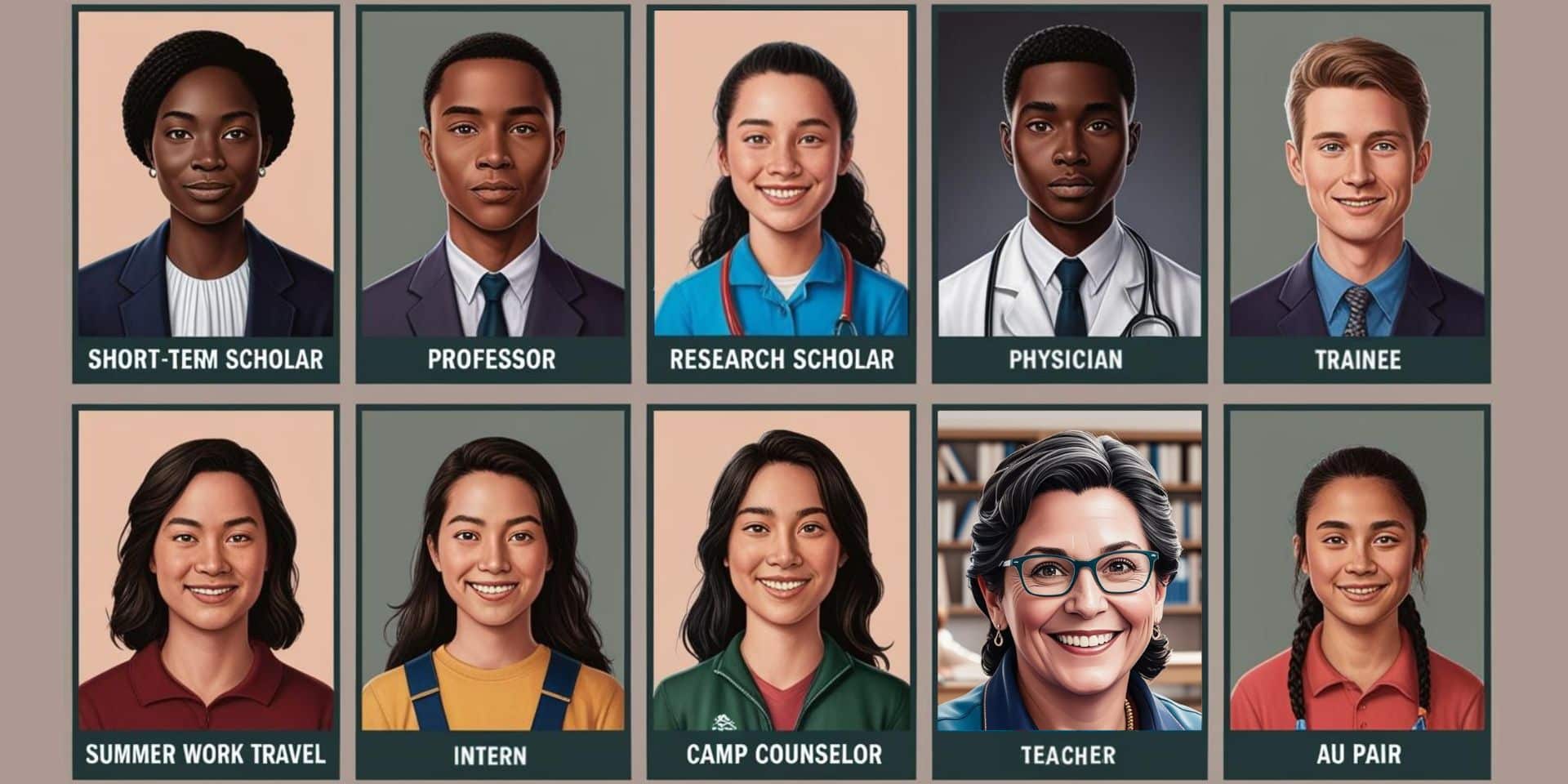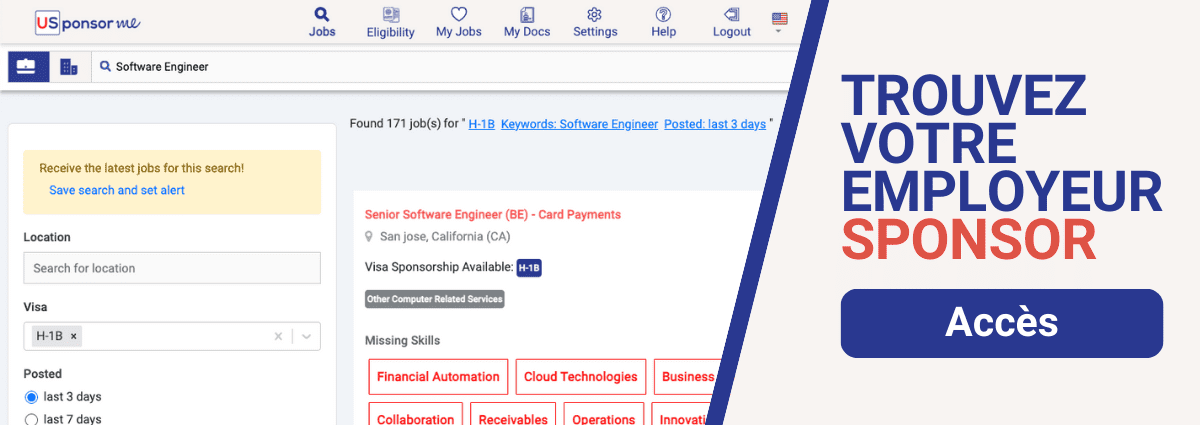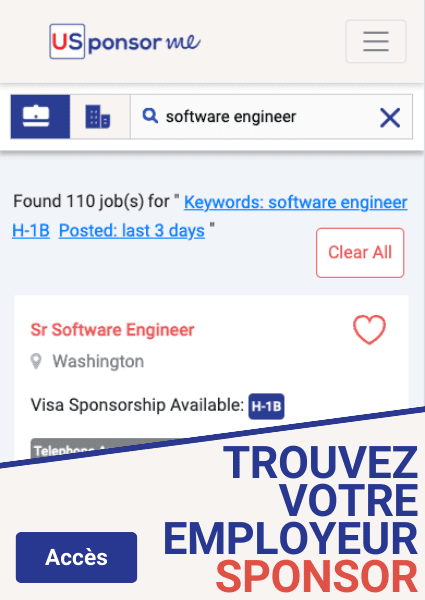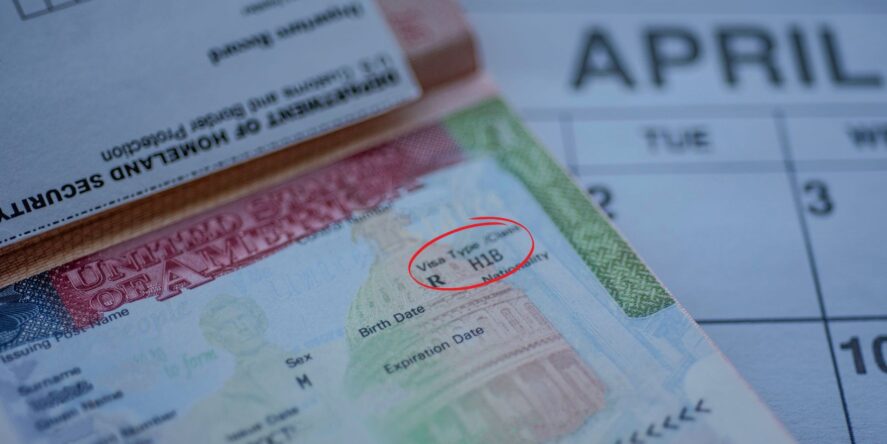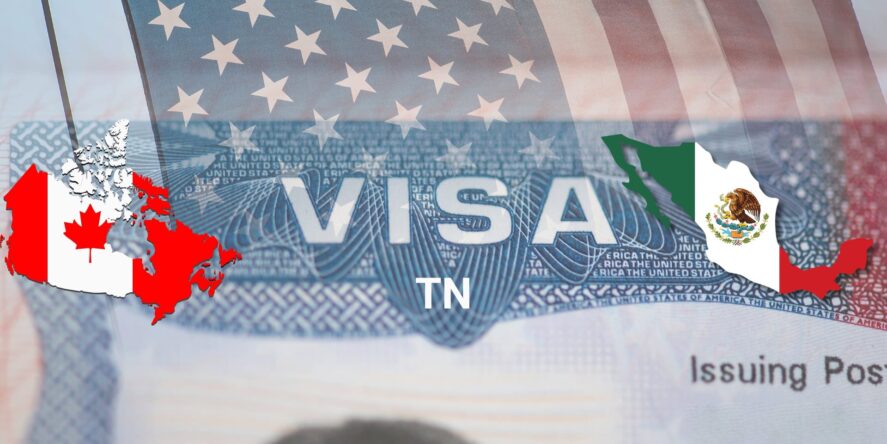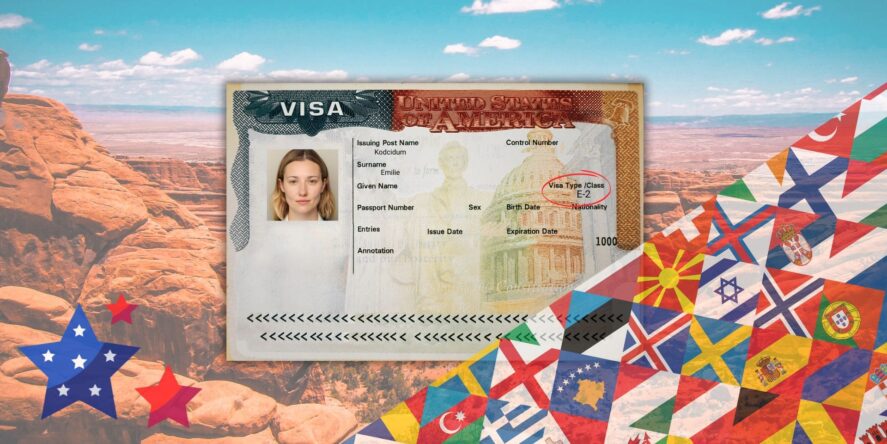Qu'est-ce qu'un visa J-1 ?
Le visa J-1 pour les États-Unis est un visa de non-immigrant. Le programme J-1 a été créé pour Le programme de bourses d'études vise à faire venir temporairement des universitaires aux États-Unis à des fins éducatives spécifiques, telles que l'enseignement ou la conduite de travaux de recherche. Aujourd'hui, elle se concentre également sur promouvoir les échanges culturels avec un échange de compétences entre les Américains et le reste du monde.
Statistiquement, le visa J-1 est le type de visa le plus courant pour les Français. En 2014, environ 15 000 ont été délivrés.
À qui s'adresse-t-il ?
Il y a 15 Programmes d'échange de visiteurs J-1Ces programmes sont tous très différents les uns des autres. Voici les différents programmes et leurs critères d'éligibilité spécifiques :
- Chercheur à court terme : Ce visa d'une durée maximale de six mois est destiné aux enseignants, chercheurs, chercheurs postdoctoraux, chercheurs prédoctoraux et étudiants diplômés qui participent à un programme de conférences, de formation ou d'observation aux États-Unis.
- Professeur et chercheur : D'une durée de 3 semaines à 5 ans, ce programme s'adresse aux enseignants ou aux chercheurs qui participent à un projet de recherche ou d'enseignement aux États-Unis.
- Médecin extraterrestre : D'une durée maximale de 7 ans, ce visa est destiné aux étudiants en médecine diplômés qui souhaitent poursuivre leurs études aux États-Unis.
- Stagiaire : D'une durée maximale de 12 mois, ce programme est destiné aux étudiants inscrits dans une université ou un établissement d'enseignement supérieur en dehors des États-Unis, ou à ceux qui ont obtenu leur diplôme dans les 12 mois précédant le début du programme et qui souhaitent participer à un programme de stage dans leur domaine d'études.
- Stagiaire : Ce visa est idéal pour les personnes titulaires d'un diplôme ou d'un certificat d'études post-secondaires obtenu en dehors des États-Unis (plus une année d'expérience professionnelle) ou ayant au total cinq ans d'expérience professionnelle. Il vous permettra de participer à un programme structuré dans votre domaine professionnel pour une durée maximale de 18 mois. Puis-je bénéficier d'un stage J1 ?
- Spécialiste : Un visa pour les experts reconnus participant à un programme d'observation ou de consultation.
- Élève de l'enseignement secondaire: Ce visa (pour un maximum de deux semestres) est destiné aux élèves de l'enseignement secondaire âgés de 15 à 18,5 ans qui fréquentent un établissement d'enseignement secondaire public ou privé accrédité.
- Étudiant au collège et à l'université: Il s'agit d'un candidat diplômé ou non diplômé d'une université ou d'un collège situé en dehors des États-Unis et inscrit à un programme diplômant ou non diplômant dans un établissement d'enseignement supérieur accrédité, ou d'un étudiant participant à un programme de stage.
- Voyages d'affaires d'été: Ce visa est idéal pour les étudiants universitaires à la recherche d'un emploi saisonnier ou temporaire non qualifié.
- Conseiller de camp: Ce programme s'adresse aux animateurs de jeunesse, aux étudiants, aux enseignants ou aux personnes ayant des compétences spécialisées et une expérience en tant que conseillers dans un camp d'été aux États-Unis.
- Au Pair : Ce visa est destiné aux jeunes de 18 à 26 ans ayant fait des études secondaires. Il permet de faire garder les enfants par des familles d'accueil pendant que le demandeur suit des cours dans un établissement d'enseignement supérieur accrédité aux États-Unis.
- Enseignant: Ce visa permet à un éducateur de rester aux États-Unis jusqu'à trois ans pour enseigner à temps plein dans une école publique ou privée accréditée.
Le visa J1 offre de nombreux avantages aux entreprises. Il est rapide et facile à obtenir par rapport à autres visas de travail non immigrants. Toutefois, il comporte également certaines restrictions.
Comment fonctionne le visa J-1 ?
Travailler aux États-Unis, vous aurez besoin d'un visa quelle que soit votre situation. Dans le cas d'un visa J-1, ce n'est pas votre entreprise qui devra vous sponsorisermais plutôt un Organisme de parrainage J-1. Veuillez noter que vous ne pouvez pas remplir votre demande de visa sans un organisme de parrainage J-1.
Ainsi, les quatre agents obligatoires dont vous avez besoin pour obtenir un visa J-1 sont :
- Vous-même (logique, je sais) ;
- L'entreprise qui veut vous embaucher ;
- Votre sponsor J1 (ou l'organisation qui le sponsorise) ;
- Le gouvernement américain (en particulier le Département d'État et votre consulat).
Vous y trouverez tous les organismes de parrainage pour le visa J-1 ici. Vous pouvez les contacter pour obtenir un accord de parrainage avant de recevoir une offre d'emploi (et je vous recommande vivement de le faire). Vous devez obtenir un accord d'un seul organisme de parrainage.
Toutefois, ces organisations ne pourront pas vous parrainer pour le visa J-1 tant que vous n'aurez pas reçu d'offre. Une fois que vous avez trouvé une entreprise qui vous propose un programme de stage, vous pouvez demander un visa.
Il n'y a pas de quota et votre candidature peut être envoyée à tout moment de l'année.
Ai-je besoin d'un avocat ?
Votre demande de visa J-1 peut être simple ou compliquée. Permettez-moi de préciser ce que j'entends par là : un cas de visa simple est un cas où une personne n'est jamais venue aux États-Unis auparavant, que ce soit en tant que touriste ou en tant qu'étudiant. Si vous êtes dans cette situation, vous n'aurez pas besoin d'un avocat et vous pourrez vous occuper de votre demande de visa tout seul. Enfin, techniquement, pas tout seul, car vous recevrez de l'aide de votre parrain ou d'une autre organisation. Ils peuvent vous aider à introduire votre demande auprès de votre parrain et de votre ambassade.
Si vous avez déjà travaillé aux États-Unis ou participé à un programme d'échange, votre situation sera un peu plus compliquée. Je vous conseille de demander l'aide d'un avocat spécialisé en droit de l'immigration pour vous assurer que vous êtes éligible et pour vous aider à préparer une demande solide.
Demande de visa J-1
Comme il n'incombe pas à l'entreprise d'accueil de parrainer votre visa, les procédures administratives du côté des entreprises sont grandement simplifiées. Vous pouvez vous dispenser d'engager un avocat si votre cas est très simple.
Et, en tant que candidat, vous aurez la possibilité de vous occuper de tous les aspects de la vie de l'entreprise. procédures administratives pour votre demande de visa J1 avec votre organisme de parrainage, sans prendre le temps précieux de votre futur employeur. Un organisme peut également vous aider à introduire votre demande de visa.
Votre employeur devra vérifier tous les documents, y compris le programme de formation que vous avez présenté.
La procédure de demande varie pour chaque type de programme et nécessite une compréhension approfondie des exigences spécifiques de chacun d'entre eux. En effet, si vous ne remplissez pas les documents appropriés, la demande du ressortissant étranger peut être refusée.
Délai de traitement du visa J-1
Le délai d'obtention d'un visa J-1 pour stagiaire varie généralement de 3 à 12 semaines, en fonction de l'organisme de parrainage choisi, de la possibilité de bénéficier d'un traitement accéléré et de la disponibilité du consulat pour un entretien.
Le visa J-1 permet-il de faire venir la famille ?
Vous aurez la possibilité d'être accompagné de votre conjoint et/ou de vos enfants. La cohabitation, ou union civile, n'est pas reconnue aux États-Unis ; vous devez donc être légalement marié. Votre conjoint et/ou vos enfants recevront également un visa, un J-2 (J2), qui leur permettra de vivre avec vous, et votre conjoint pourra également travailler aux États-Unis. Vous devrez toutefois prouver que son salaire est complémentaire et que vous n'en avez pas besoin pour vivre aux États-Unis.
Changement d'employeur pendant le programme J1
Votre visa J-1 est lié à votre entreprise ou organisation. En d'autres termes, si votre programme échoue, vous devrez transférer votre visa à une autre entreprise si vous souhaitez continuer à vivre aux États-Unis, à condition que l'organisation qui vous parraine vous y autorise.
J-1 Coût
Le prix pour obtenir un J-1 dépend de la catégorie J-1 et de la durée du programme.
Par exemple, le visa J1 pour stagiaire coûtera entre $2 000 et $3 500 pour la durée maximale. Consultez ici les détails des coûts du J1.
Qui paiera les frais de visa J-1 ?
Un visa n'est jamais gratuit.
Trois parties peuvent prendre en charge les coûts du visa J-1Le parrainage est assuré par : vous, votre employeur ou une agence gouvernementale (si vous vous inscrivez à un programme spécial). Je ne suis pas sûr que ces agences gouvernementales soient les mêmes que celles qui parrainent votre visa (cela reste à confirmer).
Pour éviter la règle des 212 (qui vous oblige à retourner dans votre pays d'origine pendant au moins deux ans après votre programme d'échange), c'est vous ou votre employeur qui devez payer les frais de visa, et non une agence gouvernementale. Par conséquent, si vous ne souhaitez pas que le Règle du visa J-1 212 de s'appliquer à vous, soyez très attentif à ce détail.
En fonction de vos moyens financiers, vous devez négocier avec votre employeur la prise en charge de ces coûts supplémentaires.
Il est donc essentiel de prendre en compte le coût de votre visa dans votre budget d'expatriation afin d'éviter d'éventuels déficits. La demande étant généralement plus forte que l'offre, il est probable que vous ayez à payer les frais de visa.
Rémunération et couverture santé
Il n'y a tout simplement aucune restriction, minimale ou maximale, en matière de revenus pour ce visa. Vous pouvez ne pas être payé du tout, vous pouvez être moins bien payé que les autres employés de l'entreprise, ou vous pouvez être mieux payé. Cependant, gardez toujours à l'esprit que le visa J-1 Trainee vous permet d'acquérir de nouvelles compétences et d'améliorer votre expertise. Dans notre exemple, Max a reçu le même salaire que les autres employés travaillant dans le même secteur que lui dans son entreprise.
En ce qui concerne la couverture médicale, vous serez couvert par l'assurance maladie de votre parrain, qui est incluse dans les frais d'inscription.. Il s'agit d'un avantage considérable, car les frais médicaux sont incroyablement élevés aux États-Unis.
Il vous permettra d'économiser entre $500 (si vous êtes célibataire) et $1,800 (si vous avez une famille) par mois pour vous et votre employeur.
Avantages fiscaux
En outre, il n'y a pas de frais juridiques au début du processus ni de frais mensuels de couverture des soins de santé, votre employeur et vous bénéficiez d'avantages fiscaux avec un visa J-1. Ce visa est exempté de :
- Taxe de sécurité sociale
- Taxe sur l'assurance-maladie
- Les taxes fédérales et d'État sur le chômage, étant donné qu'il s'agit d'un visa de programme d'échange et non d'un visa d'immigration aux États-Unis (vous ne serez donc jamais techniquement au chômage aux États-Unis).
Cela permettra à votre entreprise d'économiser environ 7,79% et à vous d'économiser 7,11% sur vos impôts. Voici un tableau résumant les avantages fiscaux des J-1 :
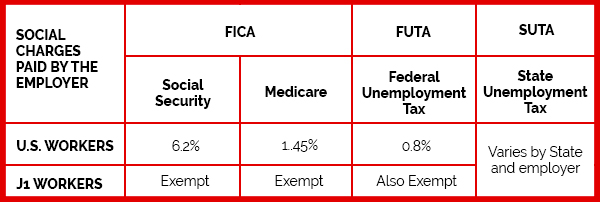
Durée du visa J-1
En fonction du programme de formation, du secteur, de l'accord entre vous et votre entreprise, et de l'organisme de parrainage, la durée du visa peut varier de 3 semaines à 3 ans.
Vérifiez la durée du visa pour le programme qui vous intéresse :
2 ans de présence physique dans le pays d'origine
Comme vous le verrez plus loin dans cet article, tous les détenteurs de visas J-1 ne sont pas soumis à l'obligation d'information.2 ans de présence physique dans le pays d'originemais certains le sont.
Cette règle stipule que vous devez retourner dans votre pays d'origine pendant au moins deux années cumulées après votre programme d'échange J-1. En d'autres termes, pendant ces deux années, vous ne pourrez pas obtenir de visa H, L ou K, de statut de résident permanent ou de visa d'immigrant.
Comment savoir si je peux bénéficier de la règle des deux ans ?
Si vous êtes déjà aux États-Unis avec un visa J-1, vous devez vérifier le statut de votre visa. Si vous voyez l'inscription, "Le porteur n'est pas soumis à l'article 212 (e) La règle des deux ans ne s'applique pas", cela signifie que vous n'êtes pas soumis à cette règle.
Dans quel cas la règle s'applique-t-elle ?
Si vous n'êtes pas encore titulaire d'un visa J-1, vous serez soumis à cette règle si
- Une agence gouvernementale finance votre programme d'échange
- Votre pays et votre domaine d'activité figurent sur la liste concernée par cette règle
Si une agence gouvernementale finance votre programme, vous serez soumis à la règle des deux ans.
Si votre pays ne figure pas dans la liste iciet que votre programme n'est pas financé par une agence gouvernementale, vous ne serez pas soumis à la règle des deux ans.
Si votre pays figure dans la liste, vérifier ici pour vérifier si votre domaine figure dans la liste, car celle-ci peut varier d'un pays à l'autre. Si votre domaine est répertorié, vous serez soumis à cette règle. Si ce n'est pas le cas et que votre programme n'est pas financé par une agence gouvernementale, vous ne serez pas soumis à cette règle.
Pour plus d'informations, vous trouverez des instructions à ce sujet ici.
La renonciation à la règle des deux ans
Si vous êtes éligible à la "règle des deux ans", il est possible d'y renoncer. Toutefois, cela n'est possible que si vous répondez à des critères très précis. Vous devez Plus d'informations ici.
Le visa J-1 vous intéresse ? Ou avez-vous déjà bénéficié de ce visa ? Partagez votre expérience dans les commentaires ci-dessous 🙂 .

